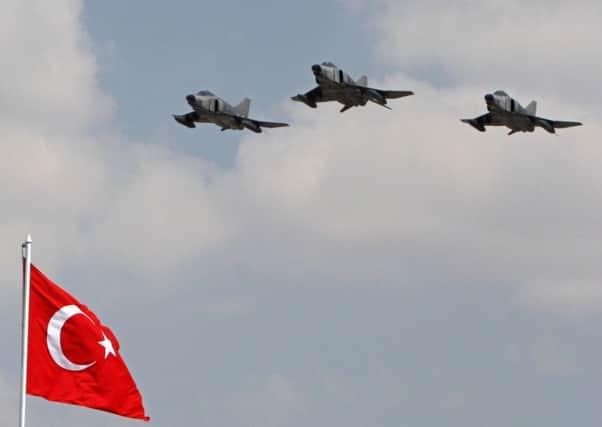Leaders: Turkey raising stakes with strike against Kurds


All the signs show that the ramifications from the war in Syria are growing. In many ways it was inevitable that the Turkish government would take retaliatory action after the suicide bombing on Sunday in Ankara that killed at least 37 people.
Although this is the third horrific terror attack in Turkey in the past five months, this is the first that has been lain squarely at the door of the Kurdish PKK. So the Turkish government sent in 11 warplanes to strike 18 targets in PKK camps in Iraqi Kurdistan.
Advertisement
Hide AdAdvertisement
Hide AdTurkey has long been at odds with the Kurds, who are the fourth-largest ethnic group in the Middle East – between 25 and 35 million of them live in a mountainous area on the borders of Turkey, Iraq, Syria, Iran and Armenia – but the PKK is relatively new, being founded in 1978. In 2013 the PKK and the Turkish government agreed a ceasefire, and it appeared divisions were being healed.
Turkey is also part of the international force ranged against IS and allows the US to use its bases for their military strikes in Syria. But Turkey is also worried about Kurdish groups in Syria and there have been clashes with them. It is clear that tensions are on the rise and the Turkish government, already under pressure over the movement of refugees fleeing Syria, is becoming ever more strained. The Ankara suicide bombing and the fallout from it have raised tensions up another notch.
And for Angela Merkel in Germany the refugee crisis has become the biggest political issue dividing her nation. The German Chancellor admitted her party had a “difficult day” after an anti-immigrant right-wing party made gains in state elections. Now, although the gains were unprecedented, they were also small and not enough to deflect her government, which has said that its immigration policy will not change.
But in Berlin on Saturday, about 2,000 right-wing demonstrators carrying German flags chanted “Merkel must go!” and “We are the people!” That and the right wing election gains amount to growing pollical pressure and Merkel may well have to take some steps if that growth continues.
And it looks like it will. Yesterday it was revealed that hundreds of migrants crossed from Greece into Macedonia after finding a way through the border fence. That is more migrants making their way probably to Germany. Last year 856,723 migrants made it to Greece by sea, and so far this year there have been 132,177 despite all the measure to try and stem the flow. That is not far off the same rate as last year.
So the ripples out in to Europe from Syria continue to grow and get stronger, and the situation in many areas is only worsening. Greater military action must be taken. It is unclear why President Vladamir Putin has announced the withdrawal of his forces from Syria – he probably thinks the political job of shoring up President Assad has been completed but it is clear that the situation on the ground is far from settled and the war goes on. The repercussions for not taking action get more difficult and dangerous by the day.
Air tax plan has wings
The Scottish Government’s commitment to make a 50 per cent reduction in air passenger duty (APD) by 2021 is designed to grow the economy. This is an admirable intention, although political opponents say the policy undermines another government priority – to reduce climate change emissions. After four years of missed targets on that front, critics say that the prospect of a significant increase in CO2 will make it even more difficult to achieve environmental goals.
For this reason, it is important that a forthcoming consultation on halving APD will ask for input on the environmental issues involved if air travel is to increase.
Advertisement
Hide AdAdvertisement
Hide AdProviding that the environmental aspect of this matter is addressed responsibly, the case for reducing APD is a strong one. The existing duty is described as “the highest form of aviation tax in the world” and its reduction or removal can only make Scotland a more attractive option for business and tourism. We cannot forget that this country is on the fringes of Europe, and imposing a heavy duty on travel adds a financial disincentive to a geographic disadvantage. In a global market, we are in no position to make it any more difficult to get here than it is already.
This measure comes at a price, of course, in the sum of £230 million in lost duty revenue for the Scottish Government. But if that is the cost of economic growth, and the potential benefits can be demonstrated to offset that figure, then cutting APD is a policy worth pursuing if it gives the Scottish economy an advantage – even if that has to happen at the expense of airports in the north of England. The message must be clear: Scotland is open for business.